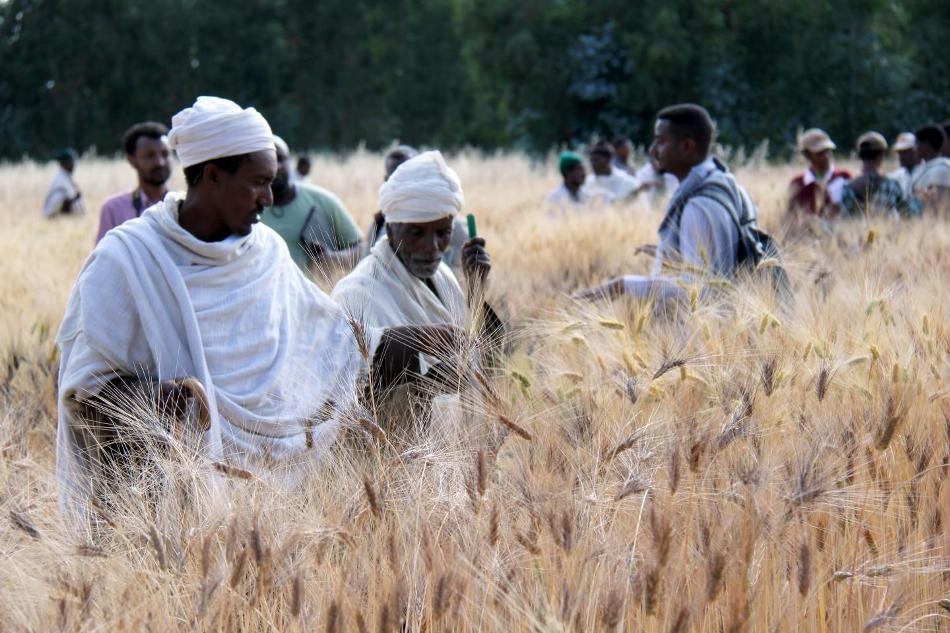Feb 19 2019
Under circumstances of fast-growing climate conditions, a new research by Bioversity International and associates deals with the challenge of climate adaptation in a manner that is scalable as well as targeted. Researchers show a distinctive method using crowdsourced citizen science that exploits farmers’ knowledge.
 These are farmers evaluating traits of durum wheat varieties in Ethiopia. (Image credit: Bioversity International/Samantha Collins)
These are farmers evaluating traits of durum wheat varieties in Ethiopia. (Image credit: Bioversity International/Samantha Collins)
Crop adaptation to climate change has turned out to be a more and more important and challenging job for smallholder farmers. Farmers require access to crop varieties and recommendations on the variety that best suits their local circumstances. And, they require it quickly. Current methods to make recommendations in marginal production environments, however, do not have two vital factors: scalability and ability to make recommendations that represent the conditions and environments under which farmers cultivate crops on their fields.
A new paper by Bioversity International and collaborators reported in PNAS demonstrates how methods that employ crowdsourced citizen science—which involves farmers themselves in the scientific studies—enhance and accelerate variety recommendations. The farmer trials performed in the study led to variety recommendations with significant differences from the existing recommendations.
This work started with the idea that in the agricultural sciences we could learn from ecologists and environmental scientists who get massive feedback from citizen scientists.
Jacob van Etten, Senior Scientist, Bioversity International
Jacob van Etten is also the lead author of the paper.
Bird ecologists gather data from the observations of bird watchers and compile it into a big database. This enables them to track bird movements and gain insights into how climate change influences migration patterns. With a large number of data-contributing bird watchers, ecologists can monitor the influence of climate change as it occurs. “It occurred to us that we need a similar citizen science approach in agriculture to help farmers to adapt to climate change.”
The researchers employed a citizen science strategy recently created by Bioversity International known as tricot—triadic comparisons of technologies—in which each farmer sows seeds from a test package of three varieties randomly allocated from a wide collection of varieties. The scientists organized the tricot trials across various landscapes and seasons to obtain an exclusive dataset covering 842 plots of common bean in Nicaragua, 1090 plots of durum wheat in Ethiopia, and 10,477 plots of bread wheat in India. Researchers subsequently linked the farmer-generated data with agroclimatic and soil data.
With the format used, even farmers with low literacy skills were able to contribute their evaluation data via different channels, including mobile telephones.
We used climatic data to try to explain why certain varieties perform better than others. The results were very interesting. Farmers were clearly able to distinguish stress-tolerant varieties. We could also generate variety recommendations for different agroclimatic zones.
Kauê de Sousa, Research Fellow, Bioversity International
Kauê de Sousa is also one of the joint lead authors of the study.
To evaluate what the tricot trial outcomes mean in reality, the investigators compared them with current recommendations, which in the case of the Ethiopian highlands were for modern wheat varieties. The tricot trials generated more geographically specific recommendations and showed the superior performance of farmer varieties that were approved to be released officially in March 2017.
The farmer-generated recommendations enhanced current strategies. They can be directly translated into actionable information for climate adaptation on the field and can be used to develop variety portfolios or, upon being integrated with seasonal climate forecasts, climate information services to further mitigate climate risk.
The novelty of this research is the explanation that it is possible to do climatic analysis of variety performance even in vulnerable, low-income areas using data produced directly by farmer citizen scientists on farms. The unique contribution of the tricot approach is that it integrates aspects of the existing approaches into a simple format that addresses the challenge of climate adaptation in a way that is scalable and targeted.
“This study confirms that our initial hunch was correct—citizen science can help farmers with climate adaptation. It also shows the enormous potential of citizen science in agriculture,” says van Etten. “It opens a whole new area of possibilities.”
This work was supported in part by cooperative agreement AID-OAA-F-14-00035, which was brought about by the generous support of the American people through the United States Agency for International Development (USAID). The work received financial support from McKnight Foundation (CCRP 16-098), the German Federal Ministry for Economic Cooperation and Development (BMZ/GIZ, Contract No. 81194988), and the Indian Council of Agricultural Research (ICAR, Annual Workplan). This research was implemented as part of the CGIAR Research Program on Climate Change, Agriculture and Food Security (CCAFS), which is performed with support from the CGIAR Trust Fund (http://www.cgiar.org/funders/) and through bilateral funding agreements.